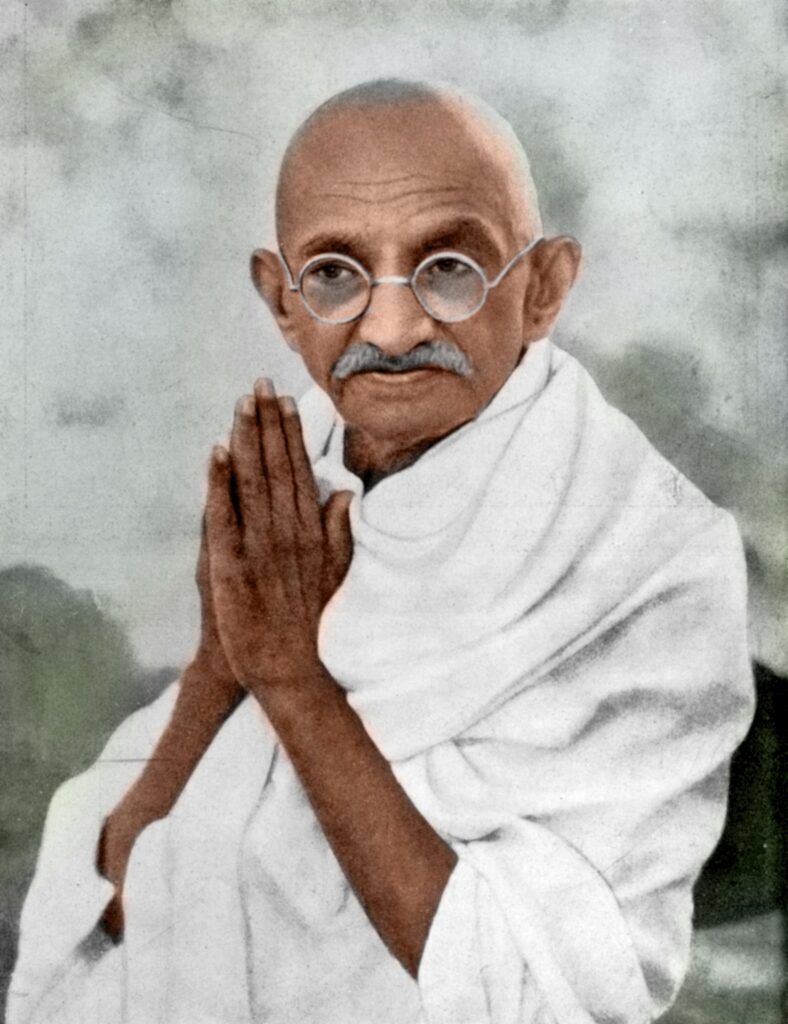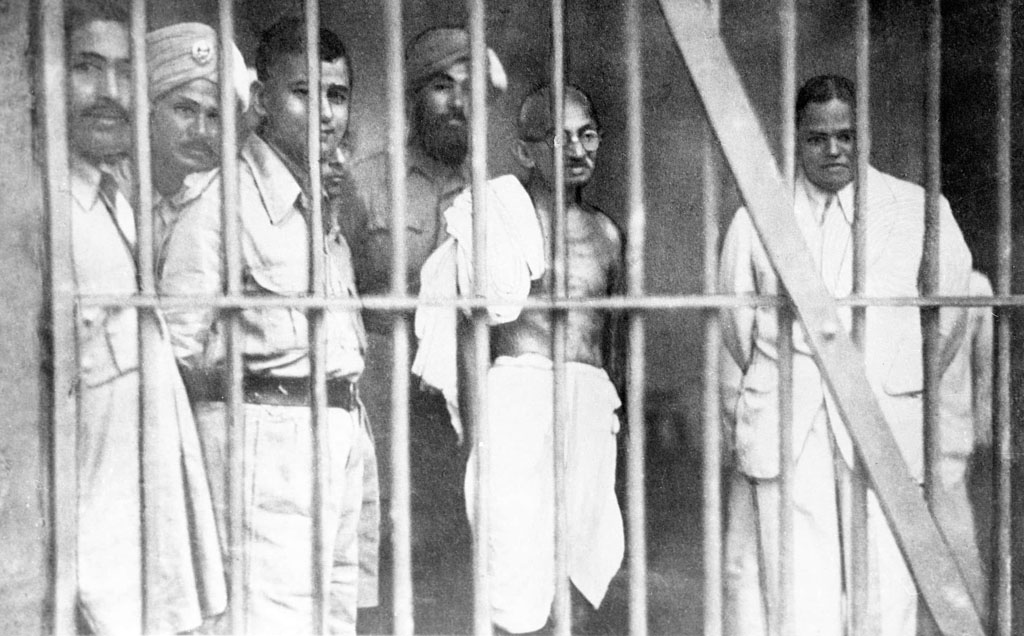Mahatma Gandhi: The Father of India

Mahatma Gandhi, a name synonymous with peace, non-violence, and Indian independence, is one of the most influential figures in the 20th century. Born Mohandas Karamchand Gandhi in Porbandar, India, in 1869, he led India’s struggle for independence from British colonial rule through his philosophy of Satyagraha, or “truth force.” His unwavering commitment to peaceful resistance and his message of love and compassion inspired millions around the world.
Early Life and Education
Gandhi’s early life was marked by a strong sense of duty and a desire to make a difference. He was married at a young age and had four sons. In 1888, at the age of 19, he traveled to England to study law. During his time in London, he was exposed to different cultures and ideas, which shaped his worldview.
South Africa and the Birth of Satyagraha
After completing his studies, Gandhi moved to South Africa to practice law. It was in South Africa that he first experienced racial discrimination and injustice. The treatment of Indian immigrants in South Africa ignited his passion for social justice and led to the development of Satyagraha.
Satyagraha, a non-violent method of protest, involves using truth and love as a means of resistance. Gandhi believed that by refusing to cooperate with unjust laws and peacefully protesting, people could force change without resorting to violence. His first major use of Satyagraha was during the Champaran Satyagraha in 1917, where he helped Indian farmers fight for better working conditions.
Return to India and the Struggle for Independence
In 1915, Gandhi returned to India and quickly became a prominent leader of the Indian independence movement. He joined the Indian National Congress and led numerous non-violent protests against British rule. One of his most famous campaigns was the Salt March, a 240-mile march to the sea to protest the British salt tax. The Salt March was a turning point in the Indian independence movement, as it united people from all walks of life in a common cause.
Gandhi’s philosophy of non-violence and his unwavering commitment to justice inspired millions around the world. He was a strong advocate for social equality and human rights, and he believed that everyone, regardless of their race, religion, or caste, was equal.

Assassination and Legacy
Unfortunately, Gandhi’s life was cut short in 1948 when he was assassinated by a Hindu nationalist. His death was a great loss to India and the world, but his legacy lives on. Gandhi’s message of peace, non-violence, and social justice continues to inspire people around the globe.
Mahatma Gandhi is remembered as a symbol of hope and a champion of human rights. His life and work serve as a powerful reminder that even in the face of injustice, it is possible to achieve change through peaceful means.
Interesting Stories About Mahatma Gandhi: The father of India
- The Salt March: One of the most iconic moments in Indian history was the Salt March, led by Gandhi in 1930. To protest the British salt tax, Gandhi and his followers marched 240 miles from Ahmedabad to Dandi, where they made their own salt. This act of defiance symbolized the Indian people’s resistance to British rule.
- The Champaran Satyagraha: In 1917, Gandhi led the Champaran Satyagraha to help indigo farmers who were being exploited by British landlords. Gandhi’s non-violent protests forced the British government to address the grievances of the farmers.
- The Dandi March: The Dandi March was a 240-mile march from Ahmedabad to Dandi, India, led by Mahatma Gandhi in 1930. It was a symbolic act of defiance against British salt tax laws. Gandhi and his followers marched peacefully, breaking the salt laws along the way. The march gained international attention and inspired Indians to resist British rule.
In conclusion, Mahatma Gandhi was a visionary leader who played a crucial role in India’s struggle for independence. His philosophy of non-violence and his unwavering commitment to social justice continue to inspire people around the world. Gandhi’s legacy will forever be remembered as a testament to the power of peaceful resistance.

Facts About Mahatma Gandhi: The father of India
Mahatma Gandhi, a prominent figure in India’s independence movement, was known for his philosophy of non-violence and his unwavering commitment to social justice. Here are some interesting facts about his life and legacy:
Early Life and Education
- Birth: Born Mohandas Karamchand Gandhi on October 2, 1869, in Porbandar, India.
- Education: Studied law in England and practiced in South Africa before returning to India.
- Marriage: Married Kasturba Gandhi at a young age.
Philosophy and Activism
- Satyagraha: Developed the philosophy of “Satyagraha,” which means “truth force,” emphasizing non-violent resistance.
- Civil Disobedience: Led various non-violent protests against British rule, including the Salt March and the Quit India Movement.
- Champaran Satyagraha: Successfully fought for the rights of indigo farmers in Champaran.
Legacy
- Indian Independence: Played a pivotal role in India’s independence movement and is often referred to as the “Father of the Nation.”
- Non-Violence: His philosophy of non-violence influenced leaders like Martin Luther King Jr. and Nelson Mandela.
- Social Justice: Advocated for social justice, equality, and the rights of marginalized communities.
- Assassination: Was assassinated by a Hindu nationalist in 1948.
Interesting Facts Mahatma Gandhi: The Father of India
- Vegetarianism: Gandhi was a strict vegetarian and promoted vegetarianism as a way to promote peace and compassion.
- Nickname: “Mahatma” means “great soul” and was given to him by Rabindranath Tagore.
- Simplicity: Lived a simple life, often wearing homespun clothing and eschewing material possessions.
- Charka: Popularized the “charka,” or spinning wheel, as a symbol of self-sufficiency and Indian nationalism.
- Prayer and Meditation: Practiced prayer and meditation daily, which was an integral part of his spiritual life.
- Hobbies: Gandhi enjoyed spinning yarn, reading, and walking.
- Influences: Influenced by thinkers like Leo Tolstoy, Henry David Thoreau, and John Ruskin.
Mahatma Gandhi’s life and teachings continue to inspire people around the world. His commitment to non-violence, social justice, and human rights remains relevant today.
Inspiring Quotes by Mahatma Gandhi
Mahatma Gandhi’s words continue to resonate with people around the world. Here are some of his most famous quotes:
- On non-violence: “Be the change you wish to see in the world.”
- On truth: “Strength does not come from physical capacity. It comes from an indomitable will.”
- On forgiveness: “An eye for an eye makes the whole world blind.”
- On courage: “Fear is a poison that destroys the mind.”
- On simplicity: “Happiness is when what you think, what you say, and what you do are in harmony.”
- On hope: “Live as if you were to die tomorrow. Learn as if you were to live forever.”
- On love: “Love is the only force capable of turning an enemy into a friend.”
- On service: “The best way to find yourself is to lose yourself in the service of others.”
- On patience: “Patience is a virtue, not a passive state.”
- On perseverance: “Never give up, for that is where victory is won.”
These quotes offer valuable insights into Gandhi’s philosophy and continue to inspire people to strive for peace, justice, and equality.

That’s all for the Mahatma Gandhi: the Father of India. I hope you’d liked the post. It was informative and helpful for you. Thank you for reading.
Please do like, share and comment. also do let me know the topic for the next article.
For more articles you can visit my website stationvidya.com or you can read https://stationvidya.com/empowering-india-the-indispensable-role-of-womens-education/
Leave a Reply